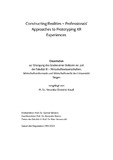Citation link:
http://dx.doi.org/10.25819/ubsi/10453| DC Field | Value | Language |
|---|---|---|
| crisitem.author.orcid | 0000-0002-4936-9787 | - |
| dc.contributor.author | Krauß, Veronika | - |
| dc.date.accessioned | 2024-02-12T14:42:26Z | - |
| dc.date.available | 2024-02-12T14:42:26Z | - |
| dc.date.issued | 2023 | de |
| dc.description | Kumulative Dissertation. Zu Kapitel 5: In reference to IEEE copyrighted material which is used with permission in this thesis, the IEEE does not endorse any of Universität Siegen's products or services. Internal or personal use of this material is permitted. If interested in reprinting/republishing IEEE copyrighted material for advertising or promotional purposes or for creating new collective works for resale or redistribution, please go to http://www.ieee.org/publications_standards/publications/rights/rights_link.html to learn how to obtain a License from RightsLink. | de |
| dc.description.abstract | In recent years, eXtended Reality (XR) technology like Augmented Reality and Virtual Reality became both technically feasible as well as affordable which lead to a drastic demand of professionally designed and developed applications. However, this demand combined with a rapid pace of innovation revealed a lack of design tool support for professional interaction designers as well as a knowledge gap regarding their approaches and needs. To address this gap, this thesis engages with the work of professional XR interaction designers in a qualitative research into XR interaction design approach. Therefore, this thesis applies two complementary lenses stemming from scientific design and social practice theory discourses to observe, describe, analyze, and understand professional XR interaction designers' challenges and approaches with a focus on application prototyping. With this as a basis, nine design implications regarding design tool support and potential future directions of interaction design research in an emerging field are derived. The respective empirical studies described in this work present 1) a sample design process based on a design case study, 2) an in-depth interview study with professional designers investigating their current challenges and general design approaches, 3) an in-depth interview study with professional designers combined with an artifact analysis focusing on prototyping practices and XR application prototypes, and 4) a literature review and comparative analysis of design guidelines originating from both academia and industry. Finally, this thesis contributes to ongoing discourses as follows: - Social practice theory perspective: this thesis provides a reflection of current interaction design practices and their challenges in an emerging field. A specific focus based on material, competence, and meaning on prototypes as well as their roles in current XR interaction design practices is provided and discussed. Finally, nine design implications for future XR interaction design tools with a focus on emerging practices are provided. - Scientific design perspective: this thesis provides a perspective on interaction design practitioners as partners in interaction design research and relates observed practices with existing design theory and frameworks. Specifically, the notion of ephemeral prototypes is coined and described and an initial taxonomy for XR design space filters in a prototyping discourse is introduced. - Interaction designers and tool creators: this thesis offers a collection of pitfalls, good practices, workarounds, and design implications for their own work. | en |
| dc.identifier.doi | http://dx.doi.org/10.25819/ubsi/10453 | - |
| dc.identifier.uri | https://dspace.ub.uni-siegen.de/handle/ubsi/2666 | - |
| dc.identifier.urn | urn:nbn:de:hbz:467-26668 | - |
| dc.language.iso | en | de |
| dc.rights | Attribution-NonCommercial-NoDerivatives 4.0 International | * |
| dc.rights.uri | http://creativecommons.org/licenses/by-nc-nd/4.0/ | * |
| dc.subject.ddc | 004 Informatik | de |
| dc.subject.other | Extended reality | en |
| dc.subject.other | Virtual reality | en |
| dc.subject.other | Augmented reality | en |
| dc.subject.other | Interaction design | en |
| dc.subject.other | Social practice theory | en |
| dc.subject.other | Erweiterte Realität <Informatik> | de |
| dc.subject.other | Virtuelle Realität | de |
| dc.subject.other | Interaktionsdesign | de |
| dc.subject.other | Theorie der sozialen Praxis | de |
| dc.title | Constructing realities – professionals’ approaches to prototyping XR experiences | en |
| dc.title.alternative | Konstruktion von Realitäten - Expertenansätze zum Prototyping von XR Erfahrungen | de |
| dc.type | Doctoral Thesis | de |
| item.fulltext | With Fulltext | - |
| ubsi.contributor.referee | Stevens, Gunnar | - |
| ubsi.contributor.referee | Boden, Alexander | - |
| ubsi.date.accepted | 2023-11-29 | - |
| ubsi.organisation.granting | Universität Siegen | - |
| ubsi.origin.dspace5 | 1 | - |
| ubsi.publication.affiliation | Fakultät III - Wirtschaftswissenschaften, Wirtschaftsinformatik und Wirtschaftsrecht | de |
| ubsi.subject.ghbs | QGTX | de |
| Appears in Collections: | Hochschulschriften | |
Files in This Item:
| File | Description | Size | Format | |
|---|---|---|---|---|
| Dissertation_Krauss_Veronika_Christine.pdf | 40.24 MB | Adobe PDF |  View/Open |
This item is protected by original copyright |
Page view(s)
454
checked on Dec 26, 2024
Download(s)
104
checked on Dec 26, 2024
Google ScholarTM
Check
Altmetric
This item is licensed under a Creative Commons License


